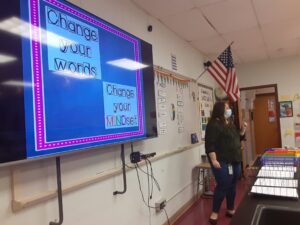
Empowering students to be their best is a core value in Briarcliff Schools.
Briarcliff Middle School students, for example, are constantly learning ways to use a positive outlook on life and a growth mindset to achieve success and happiness in both school and life.
As they wrapped up Optimistic October at the middle school, students in Julie Gallagher’s science class had a lesson about the difference between a fixed and a growth mindset.
Ms. Gallagher began the class by discussing the characteristics of a fixed mindset. Someone with a fixed mindset would think that intelligence is static. They would tend to avoid challenges, give up easily due to obstacles, see effort as fruitless, ignore useful feedback, and be threatened by others’ success.
On the other hand, people with a growth mindset would feel that intelligence can be developed over time. They would tend to embrace challenges, persist despite obstacles, see effort as a path to mastery, learn from criticism, and be inspired by others’ success.
Ms. Gallagher discussed various statements while the students had to decide if they belonged to a fixed or growth mindset.
Some examples of fixed mindset statements were: “I’m just not good at this,” “I give up,” and “I’m never going to get this.” Statements that were of a growth mindset were: “I’ll use some of the strategies I learned,” “this may take some time and effort,” and “I need to figure out what I did wrong and get some help.”
“When you change your words, you can change your mindset,” Ms. Gallagher said to the students. “It is okay to feel that things are difficult, but if you change the words and say things differently, you then have a growth mindset and that can help you have a positive attitude.”
According to Ms. Gallagher, one way of changing a fixed mindset to a growth mindset is by simply using the word “yet.”
She asked students to come up with different ways to change a “fixed mindset” statement to one that shows a growth mindset and students came up with several examples.
Ms. Gallagher mentioned that someone with a fixed mindset would say that they don’t want to work harder because they are afraid of making mistakes and she shared her favorite saying: “Mistakes are proof that you are trying.”
“My hope for you this year is that you move yourselves into a growth mindset,” Ms. Gallagher said to the students. “Remember BEARS: Brings positive attitude, Enters prepared, Actively participates, Reaches for excellence and Shows respect and kindness.”
After the discussion, students were able to select coloring pages with positive statements on them to hang around the school hallways. They colored the pages either on their own or in pairs.
Aarit selected a page that said “The expert at anything was once the beginner.”
“I chose it because everybody starts at some point but you can always become better in whatever you choose to invest your effort,” Aarit said.
Siobhan’s page said “Progress is impossible without change.”
“I chose this page because sometimes I give up and I don’t think about how when I give up I’m not progressing,” she said.






